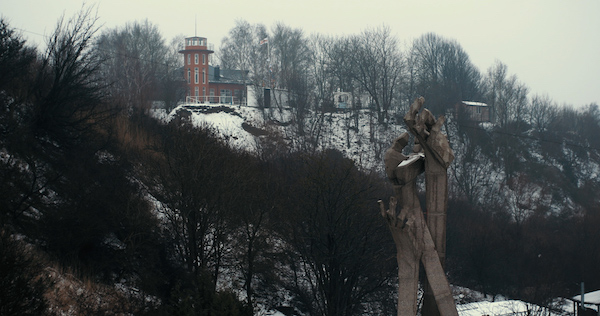Doc Talk: Fascism Then and Now — At the Arlington International Film Festival
By Peter Keough
A pair of documentaries featured in this year’s Arlington International Film Festival (November 2-5) take a cold look at the death cult of fascism — past, present, and to come.

A scene from the documentary The Palmnicken Tragedy.
The coast of the Baltic Sea in winter is stark, ice-fringed, and lashed by gray waves. This is a recurring image in Andrey Proskuryakov’s The Palmnicken Tragedy (2022), a Claude Lanzmann-like account of the massacre of thousands of camp prisoners — mostly women and children — in January and February 1945. It happened on the beach outside the title town, some 50 kilometers from what is now the Russian city of Kaliningrad, which until 1946 had been the German city of Königsberg, East Prussia.
The prisoners had been evacuated from nearby camps and forced on a death march during which thousands perished. They were then led to the beach where thousands more were shot, their bodies left in the surf and sand. The guns of the advancing Soviet army could be heard in the distance. They would arrive a day too late.
Proskuryakov brings together witnesses, survivors, and the descendants of survivors, both Jewish and German, as well as journalists and historians, to recall the massacre, which has been almost forgotten in the chronicle of Nazi genocide.
Among them is Simcha Koplowicz, the son of Sheva Koplowicz, who managed to escape the massacre. Koplowicz recalls his mother’s stories of her sufferings in the labor camp, how a Nazi guard struck her while she was in the latrine, knocking into the cesspit a piece of bread she had hidden in her clothing. Another inmate volunteered to retrieve it if she could have half. Sheva agreed, and they ate it.
Margitta Sünwoldt, a German inhabitant, recalls how the summer of 1944 on the beach in Palmnicken was wonderful. The war seemed far away. But it would seem much closer the following January when she and her brother were returning from the bakery and witnessed the prisoners being marched through the streets. A man who tried to escape was shot right in front of them. She remembers the man’s eyes, the blood in the snow, the rags that the desperate, starving victims wore.
They said nothing about what they saw to their parents. She was five. She and her brother only talked about the incident many years later when they were in their 60s. Luckily, she and her family were able to flee East Prussia by ship before the Soviets arrived, escaping the chaos described in Walter Kempowski’s apocalyptic 2006 novel All for Nothing.
Gunter Nitsch, who was also a child when the massacre took place, was not so lucky. He recalls how the Russians took his grandfather with other men from the town and forced them to dig up the victims’ bodies. When the family was starving, Nitsch had to beg for food from Soviet soldiers. One officer invited him into his kitchen and offered him a helping of stew, which he served him in a “piss pot.” Nitsch ate it anyway. The officer refilled the pot and the boy brought it home, where his mother served it up to the rest of the family. She said they should pray for the kind officer who gave it to them. Later Nitsch recalls how — for several months after the Red Army arrived — his mother had been raped repeatedly by soldiers.
Martin Bergau was 16 when he witnessed the sea of bodies off the coast after the executions. He remembered that they looked like they were swimming and thought at the time if only Hitler had seen what was happening he would have stopped it.
Bergau would participate in a related Palmnicken mass killing a few days later as a member of the Hitler Youth. Along with other boys in his troop he helped keep order as an SS officer executed around 50 women. He remembers the blood spattering on the officer’s face, and how some of the bodies still twitched in the open pit into which they fell before being dispatched with a coup de grace. Bergau claims that he did not fire a shot. Questioned in the film if he felt like he had done wrong, Bergau replies, “I acted as a decent man should.” If he hadn’t in 1994 written a book about his experiences, The Boy from the Amber Coast, the Palmnicken tragedy might have been forgotten.
So who has been held accountable? In 1965 the only person charged with the atrocity, Fritz Weber, a low-ranking SS officer, committed suicide while in custody.
(The Palmnicken Tragedy screens on November 3 at 7 p.m. at the Capitol Theatre.)
A turning point in the success of the Nazi movement occurred in 1934 when the regime altered the oath of service of the armed forces so that those taking it swore loyalty not to the German constitution but to Adolf Hitler. Instead of serving the rule of law they would be at the service of a single deranged individual.
The military oath for US armed forces, on the other hand, still specifies fealty not to an individual but to institutions, demanding that those who take it “support and defend the Constitution of the United States against all enemies, foreign and domestic.” But, as seen in Charlie Sadoff’s cogent and alarming Against All Enemies (2023), some former military members have interpreted “enemies” as referring to the government itself. The film traces this subversive, terrorist turn back to the post-Civil War rise of the Ku Klux Klan. It is now reaching the point that another civil war looms as a real possibility.

A scene from the documentary Against All Enemies.
That perverted perception of the oath has empowered a proliferation of insurrectionary outfits with ties to the military, such as the Three Percenters, the Proud Boys, the Oath Keepers, and more recently the Patriot Front. Some of these organizations spearheaded the assault on the Capitol on January 6, 2021, an attempted coup that, according to many of those interviewed in the film, is just a foreshadowing of the assault on democracy yet to come.
Such a movement would not be possible without the support of those in high places, people with elite university educations who should know better. Military brass like the convicted felon, Trump-pardoned, disgraced ex-general Michael Flynn who brings leadership credibility and insurrectionary savvy to the project. Or numerous elected officials in Congress in the Senate who have taken an oath of office like that of the military and have similarly violated it. In the latter category the film focuses on J.D. Vance and Eric Greitens, both of whom campaigned in 2022 for the Senate on a platform of election denial and other MAGA cant. Vance won in Ohio, Greitens lost in the Missouri primary, but neither would agree to be interviewed for the film.
The filmmakers do, however, put together an impressive collection of spokespersons, including academics, politicians, security experts, and psychologists — some of whom attempt to explain how military members once pledged to protect democracy now are determined to violently overthrow it. One of the interviewees is former Army forward observer Kristofer Goldsmith who, traumatized by his experiences in Iraq, fell into a spiral of self-destructiveness and alienation. He was almost seduced by some of the groups pandering to disaffected ex-military like himself. But Goldsmith recovered and fought back. With his organization Task Force Butler, he and other veterans have set out to expose right-wing extremists trying to recruit those who swore to defend the constitution into organizations sworn to overturn it.
“So the ideal solution is deradicalization, but that’s not something I’m interested in,” Goldsmith says near the end. “I’m interested in justice and I’m interested in imposing costs on people who are trying to hurt America and Americans. All I think about all day is finding bad guys and hoping that they end up in jail.”
He concludes, “I’m a Nazi hunter.”
In other words: Lock them up.
(Against All Enemies screens on November 2 at 7 p.m. at the Capitol Theatre followed by a panel discussion with Sadoff and the producer Ken Harbaugh.)
Peter Keough writes about film and other topics and has contributed to numerous publications. He had been the film editor of the Boston Phoenix from 1989 to its demise in 2013 and has edited three books on film, most recently For Kids of All Ages: The National Society of Film Critics on Children’s Movies (Rowman & Littlefield, 2019).
Tagged: Against All Enemies, Andrey Proskuryakov, Arlington International Film Festival, Charlie Sadoff, fascism
